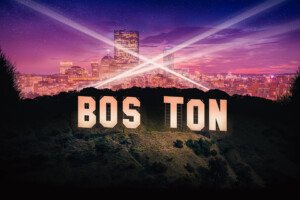Good Will Hunting: An Oral History
Fifteen years after the release of the movie that made them stars, Matt Damon and Ben Affleck—along with the rest of the cast and crew—reflect in their own words on how a long-shot film by two unknowns became one of Hollywood's biggest success stories.
Scott William Winters (the Harvard grad student): We didn’t do a lot of takes. I think Gus liked what I was doing. And Matt and Ben were really complimentary. Matt was like, “You know, dude, if you can find a way that gets you out of the room that’s more dignified….” I really appreciated it, but I told them I thought that the way it was written was spot-on.
Affleck: “How do you like them apples?” is a saying people said all the time—at least when we grew up. All we did was affix that joke to our story where a guy basically trumps another guy over a girl, a sort of Rocky, underdog, working-class hero over this smug, Ivy villain, which was a little bit cartoonish, but we thought maybe we could get away with it.
 As both a working stiff and an intellectual, Will Hunting embodied Boston’s dueling identities.
As both a working stiff and an intellectual, Will Hunting embodied Boston’s dueling identities.
Will is encouraged by MIT professor Gerald Lambeau to pursue a career in math, but he hedges, unwilling to leave his friends in Southie behind—until Chuckie tells him, “You got something none of us have” and would be a fool not to take the opportunity. “You don’t owe it to yourself,” Chuckie says. “You owe it to me.” It was a scene that they had practiced hundreds of times in their living room.
Affleck: Matt and I worked construction a couple of summers for a guy named Paul Maggiore. That, to me, felt like those moments where I was taking real-life things and putting them in the movie. Things that mattered to me.
Damon: I remember vividly the scene where Ben tells me to leave town, where he says,“If you’re still here to come over and watch the Patriots game, I’ll fucking kill you.” That scene, we did three takes on Ben. He got it in the first take and I knew we were done, we could go home. And he had this kind of stunned look on his face and Gus was like, “Would you like to do another?” And Ben was like, “Yeah, yeah,” so he did another one, which was great. And Gus said again, “Would you like to do another one?” This has taken 15 minutes, at the most, for Ben to do these three takes. I was like, “Honestly, you got it on the first one.” And he knew it, but he couldn’t believe that it was over.
Affleck: It was like a lot of things, where the buildup is bigger than the event itself, and the event is over pretty quickly.
Damon: He had been waiting to do this for so long. And he’d done everything he wanted to do with it. It was simple, it was honest, it was beautiful. But there was still the shock of, he can’t be done, you know?
Affleck: I had been thinking about the scene and how it was gonna play out, and then reading it out loud, and writing it, and rewriting it, and rehearsing it in my mind over years and years. It was just kinda like, “Is it over?” It’s just hard to almost internalize the fact that, okay, we’re going to wait four years, and it’s gonna be over in five seconds. Kind of like losing my virginity.
The movie had a limited opening in December 1997—just beating the end-of-year deadline for the 1998 Academy Awards—but opened across the country in January 1998. Its nine Academy Award nominations included best screenplay, best supporting actor, and best picture.
Missy Stewart: It was an amazing lineup that year, with Titanic and L.A. Confidential.
Damon: Ben and I talked about it recently. We were younger than we felt. I was 22 and Ben was 20 when we first started writing it. And then it came out when I was 27 and Ben was 25. I mean, Ben’s still the youngest writer to ever win an Oscar for screenwriting. I’d be the youngest if it weren’t for Ben. Fucking asshole.
Stewart: It was just a wild ride. We were all really happy when Matt and Ben won the screenplay award, then Robin won for best supporting actor, and that we were up for the best picture category.
Su Armstrong : We would have taken home a few more awards if not for that boat picture.
Affleck: The thing about the Oscars is that I sort of affirmed that image that people had of me as a complete idiot, because I just kind of panicked. I mean, we thanked Boston twice. Don’t you think Boston was glad to see it thanked the first time?
The movie launched the careers of both Damon and Affleck. Fifteen years later, its legacy follows the careers of the cast and production team everywhere.
Skarsgard: It’s amazing how often people come up to you in airports and on streets and start talking about it and say, “I see it at least once a year,” or “I’ve seen it 30 times.” It’s a film that people carry around with them in a way.
Williams: I think it’s a movie that people experienced. It’s more than a movie for some people, which is kind of wonderful.
Affleck: When I look at my own career, my life, and particularly directing, it’s all rooted in this experience. Realizing that the actors need to take responsibility for their performances, and that there is no right answer and that it’s just about discovering things. All that came from Gus.
Damon: I don’t think there could ever be another movie that I felt that way about. Because of what it meant for our lives, because of that time in our life. Another movie couldn’t occupy that much of my heart and soul at this point in my life. A movie could never change my life like that again.
Affleck: For a while, we thought maybe we should chill and just do other stuff, and not be Matt and Ben, Matt and Ben. But now, I’m gonna direct Matt in the Whitey movie. We have our company together, we’re developing together. And Matt lives down the street from me like he used to. His kids are living with him, the way we used to live with our folks. The only difference is that we have pools.
Wait, There’s More!
Online Extra: Scenes from the Cutting Room Floor
Magazine stories, like films, often end up with a lot left on the cutting room floor. Here are some additional juicy moments from our conversations with the cast and crew of Good Will Hunting, where they talk about getting the Red Sox footage into an R-rated film, how they stole the film’s title from a friend, and their ongoing beef with Mindy Kaling.


